Welcome back to This Week in Apps, the Extra Crunch series that recaps the latest OS news, the applications they support, and the money that flows through it all. What are developers talking about? What do app publishers and marketers need to know? How are politics impacting the App Store and app businesses? And which apps are everyone using?
This week, we’re looking at several major stories, including the whopping $4 billion PayPal just spent on browser extension and mobile app maker, Honey, as well as the release of the Apple Developer app, a new plan for iOS 14, Google Stadia’s launch, AR gaming’s next big hit (or flop?), e-commerce app trends, Microsoft’s exit from voice assistant mobile apps, and so much more.
Plus, did you hear the one about the developer who got kicked out from his developer account by Apple, leaving his apps abandoned?
Headlines
Apple to overhaul iOS development strategy after buggy iOS 13 launch
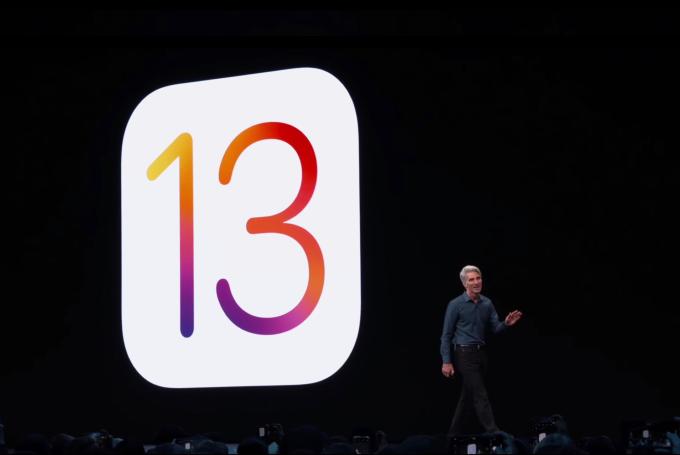 Apple’s iOS 13 release was one of its worst, in terms of bugs and glitches. Now Apple is making an internal change to how it approaches software development in an effort to address the problem. According to Bloomberg, Apple’s Software chief Craig Federighi and other execs announced its plans at an internal meeting. The new process will involve having unfinished and buggy features disabled by default in daily builds. Testers will then have to optionally enable the features in order to try them. While this change focuses on making internal builds of the OS more usable (or “livable”), Apple hopes that over time it will improve the overall quality of its software as it will give testers the ability to really understand what’s supposed to now be working, but isn’t. The testing changes will also apply to iPadOS, watchOS, tvOS, and macOS, the report said.
Apple’s iOS 13 release was one of its worst, in terms of bugs and glitches. Now Apple is making an internal change to how it approaches software development in an effort to address the problem. According to Bloomberg, Apple’s Software chief Craig Federighi and other execs announced its plans at an internal meeting. The new process will involve having unfinished and buggy features disabled by default in daily builds. Testers will then have to optionally enable the features in order to try them. While this change focuses on making internal builds of the OS more usable (or “livable”), Apple hopes that over time it will improve the overall quality of its software as it will give testers the ability to really understand what’s supposed to now be working, but isn’t. The testing changes will also apply to iPadOS, watchOS, tvOS, and macOS, the report said.
Apple launches the Apple Developer App
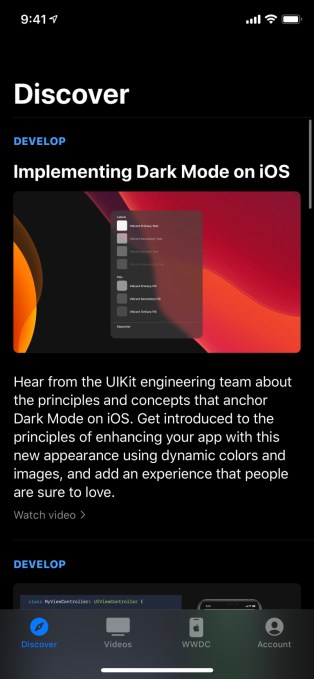 Apple rebranded and expanded its existing WWDC app to become a new Apple Developer app that can stay with its 23 million registered developers year-round. Instead of only including information about the developer event itself, the app will expand to include other relevant resources — like technical and design articles, developer news and updates, videos and more. It also will offer a way for developers to enroll in the Apple Developer program and maintain their membership. Apple says it found many developers were more inclined to open an app than an email, and by centralizing this information in one place, it could more efficiently and seamlessly deliver new information and other resources to its community.
Apple rebranded and expanded its existing WWDC app to become a new Apple Developer app that can stay with its 23 million registered developers year-round. Instead of only including information about the developer event itself, the app will expand to include other relevant resources — like technical and design articles, developer news and updates, videos and more. It also will offer a way for developers to enroll in the Apple Developer program and maintain their membership. Apple says it found many developers were more inclined to open an app than an email, and by centralizing this information in one place, it could more efficiently and seamlessly deliver new information and other resources to its community.
PayPal buys Honey for $4 billion
PayPal has made its biggest-ever acquisition for browser extension and mobile app maker, Honey. TechCrunch exclusively broke the news of the nearly all-cash deal, noting that Honey currently has 17 million monthly actives. But PayPal was interested in more than the user base — it wanted the tech. The company plans to insert itself ahead of the checkout screen by getting involved with the online shopping and research process, where customers visit sites and look for deals. Honey’s offer-finding features from its mobile app will also become part of PayPal and Venmo’s apps in the future.
Cloud gaming expands with Google Stadia launch
Cloud-based gaming could benefit from the growing investment in 5G. Google Stadia, which launched this week, is a big bet on 5G in that regard. Though the early reviews were middling, Google believes the next generation of gaming will involve continuous, cross-device play, including on mobile devices. This trend was already apparent with the successes of cross-platform games like Fortnite, Minecraft, Roblox, and PUBG, for example. Meanwhile, console makers like Microsoft are working to build out their own cloud infrastructure to compete. (Microsoft’s xCloud launches in May 2020.) Google could have a head start, even if Stadia today feels more like a beta than a finished product. But one question that still arises is whether Google is serious about gaming, or only sees Stadia as a content engine for YouTube?
Microsoft kills Cortana mobile apps
![]() Microsoft this week belatedly realized it can’t compete with the built-in advantages that Siri and Google Assistant offer users, like dedicated buttons, hands-free voice commands, workflow building and more. The company decided to shut down its Cortana mobile applications on iOS and Android in a number of markets, including Great Britain, Australia, Germany, Mexico, China, Spain, Canada, and India. Any bets on when the U.S. makes that list?
Microsoft this week belatedly realized it can’t compete with the built-in advantages that Siri and Google Assistant offer users, like dedicated buttons, hands-free voice commands, workflow building and more. The company decided to shut down its Cortana mobile applications on iOS and Android in a number of markets, including Great Britain, Australia, Germany, Mexico, China, Spain, Canada, and India. Any bets on when the U.S. makes that list?
SF Symbols expands
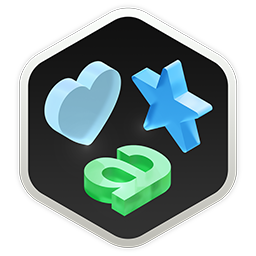 At WWDC, Apple launched SF Symbols, offering over 1,000 highly configurable symbols for use in apps running iOS 13 or later, watchOS 6 or higher, and tvOS 13 or later. This week, Apple updated the SF Symbols Mac app to include over 1,500 symbols — each in a wide range of weights and scales, to make it easier to design adaptable user interfaces that fit with Apple’s own design guidelines. Version 1.1 also adds custom symbol validation, a new sidebar with categories for faster browsing, and the option to receive updates automatically, Apple says.
At WWDC, Apple launched SF Symbols, offering over 1,000 highly configurable symbols for use in apps running iOS 13 or later, watchOS 6 or higher, and tvOS 13 or later. This week, Apple updated the SF Symbols Mac app to include over 1,500 symbols — each in a wide range of weights and scales, to make it easier to design adaptable user interfaces that fit with Apple’s own design guidelines. Version 1.1 also adds custom symbol validation, a new sidebar with categories for faster browsing, and the option to receive updates automatically, Apple says.
Apple locks out developer for digging through beta software to find secrets
Guilherme Rambo gained notoriety for his ability to spoil Apple’s big surprises. The developer digs through Apple’s code and APIs to find things that Apple hasn’t yet talked about — or didn’t even realize was being exposed. More recently, Rambo spoiled a lot of what Apple had planned for iOS 13, including updates to its apps, new gestures and features, and even dark mode. He also uncovered details about a yet-to-be-released new Apple hardware device, Air Tag, which presumably works like an Apple version of the Tile Bluetooth tracker.
This week, Rambo said he’s been locked out of his developer account since August. What’s crazy about this, or as Daring Fireball says, “Kafka-esque,” is that he can’t get an answer from Apple as to why. Of course, we all know why…right? Apple is sick of the spoilers.
But let’s not forget that the Apple Developer Agreement contains a confidentiality clause that he appears to have violated by his reverse engineering and subsequent publication of findings on 9to5Mac. Still, the fact that Apple won’t explicitly admit to anything here or even respond to him is concerning, especially since he’s the one violating the NDA. Plus, Rambo still has apps in the App Store, and now no way to update them. Which begged the question, does Apple care more about its own interests here than that of its customers, the apps’ end-users?
After a lot of bad press, Rambo said Apple finally resolved the situation on Friday. You know, three months later.
Google is bringing back the Android Developer Challenge
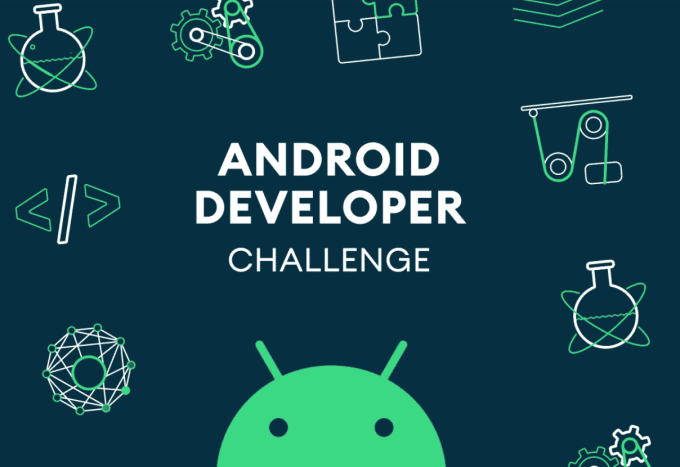 Developers who submit ideas by December 2 can compete to have their app showcased on Google Play in a collection, win tickets to Google I/O and maybe even have their apps showcased at I/O in places like the sandbox, sessions and maybe the keynote. This time around, Google is looking for new ideas that leverage its advances in on-device machine learning, like Google put to use in Live Captions, Smart Compose, and more. More details are available here on the Dev Challenge website.
Developers who submit ideas by December 2 can compete to have their app showcased on Google Play in a collection, win tickets to Google I/O and maybe even have their apps showcased at I/O in places like the sandbox, sessions and maybe the keynote. This time around, Google is looking for new ideas that leverage its advances in on-device machine learning, like Google put to use in Live Captions, Smart Compose, and more. More details are available here on the Dev Challenge website.
Amazon locks it in ahead of Black Friday
Amazon was the most downloaded U.S. marketplace app in the U.S. for Q1 to Q3 2019, according to Sensor Tower. It rose one position from 2018, followed by Wish, letgo, OfferUp, and eBay. Amazon’s market share has been climbing over the past few years, in terms of U.S. Marketplace apps, going from 17% in 2016 to 22% in the first three quarters of 2019. The top five apps accounted for nearly 75% of Marketplace downloads (among the top 100 Shopping apps) in the U.S. between Q1 and Q3 2019 . The next 11 apps accounted for the remaining 26%, the report says.
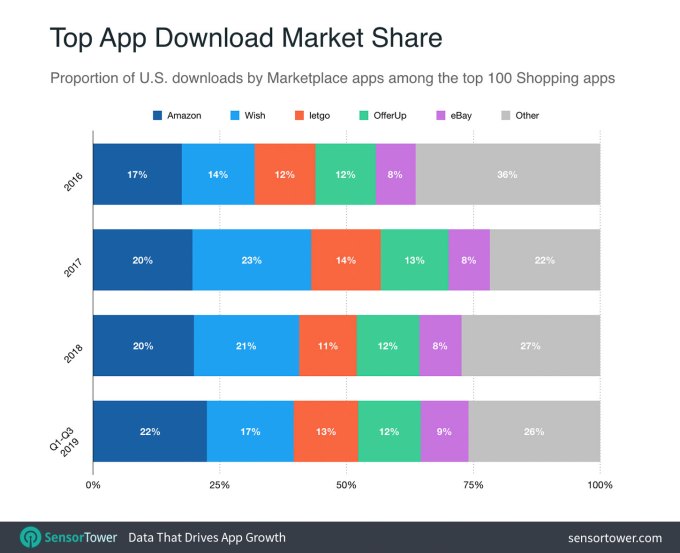
Meanwhile, worldwide shopping app downloads hit an all-time high of 1.1 billion in Q3, with new user growth maintained at 15% year-over-year. Amazon was the top shopping app, followed by Wish, AliExpress, Shopee, and Pinduoduo. Downloads in the category are expected to reach 2.7 billion by 2023 on the App Store, and 3.8 billion on Google Play.
Shopping Apps rebound in China
After a big drop in Q1 2019, shopping app downloads have bounced back in China, Sensor Tower says. iOS shopping app apps were installed more than 160 million times in China in Q3, an all-time high and up 21% year-over-year. The U.S., meanwhile, is the second-biggest market for App Store downloads, followed by Japan, Russia, and Great Britain. On Google Play, India leads with downloads growing 9% q-over-q in Q3 after peaking at nearly 200M in Q4 2018.
The next big Niantic title is…Catan?
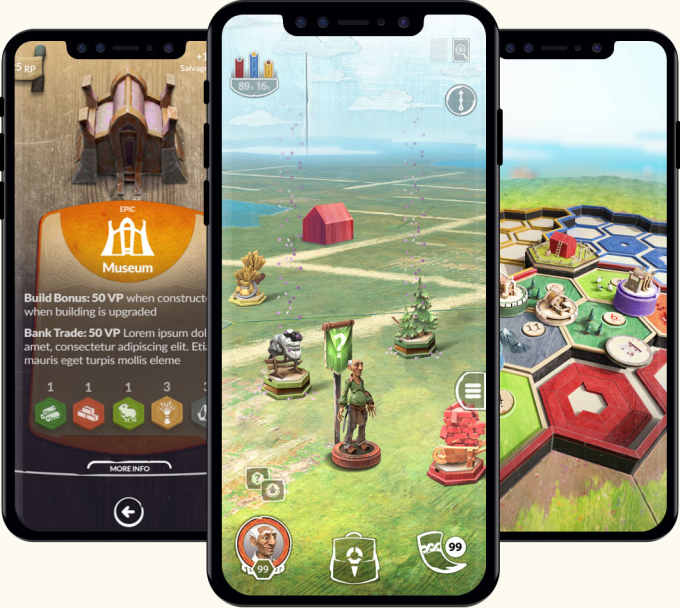 Ingress led to breakout AR hit Pokémon Go, which was followed by the solid release of Harry Potter: Wizards Unite. Now it looks like the next game to get Niantic’s “real world game” treatment will be Catan. Yes, as in the Settlers of Catan board game. This will be an interesting test for Niantic, as its biggest hits to date have focused on well-known and hugely popular existing IP. Catan, however, is known by more of a niche crowd. Niantic confirmed its involvement to TechCrunch, and we’ll expect more details to be revealed in early 2020.
Ingress led to breakout AR hit Pokémon Go, which was followed by the solid release of Harry Potter: Wizards Unite. Now it looks like the next game to get Niantic’s “real world game” treatment will be Catan. Yes, as in the Settlers of Catan board game. This will be an interesting test for Niantic, as its biggest hits to date have focused on well-known and hugely popular existing IP. Catan, however, is known by more of a niche crowd. Niantic confirmed its involvement to TechCrunch, and we’ll expect more details to be revealed in early 2020.
Niantic is one of the companies leading AR gaming today, but the format hasn’t led to any breakout pop-culture sensations since Pokémon Go. Even Minecraft Earth lagged behind Pokémon Go and Harry Potter during its first week. The AR Minecraft app saw 1.4 million downloads in the week following its U.S. launch — behind Pokémon Go’s 32.7 million week one downloads and Harry Potter: Wizards Unite’s 3.1 million.
Google partners with Udacity on new Kotlin course
Advanced Android in Kotlin, co-developed by Google and Udacity, is a new self-paced course where experts from the Android team at Google will introduce new developers to Kotlin, including the advanced features you can build into Android apps. The course will teach you about notifications, graphics, animations, third-party authentication, adding maps to apps, custom views, and how to properly test your apps.
One of world’s biggest apps just got bigger
TikTok has now surpassed 1.5 billion downloads across the App Store and Google Play, making it the third-most downloaded non-gaming app of the year. Last year, it was the fourth-most downloaded. This year alone, it has seen 614 million downloads, up 6% from the same time last year. That means TikTok is now bigger than Facebook and Instagram. (No wonder Facebook is worried and trying to clone it left and right!)
One area where TikTok hasn’t yet ranked highly is revenue. In October, the top-grossing apps continued to be led by Tinder, Netflix, YouTube, and other streamers. But TikTok is investing in new products that could ultimately have an impact here — including social commerce.
This week, TikTok confirmed it’s testing a way for users to add a link to e-commerce sites or other destinations in their profile. The feature could be used to send fans to merch sites, or brands could use it to send users to their online shop. News publishers could also use the feature, as they do on Instagram, to send users to their news publication’s site.
Of course, TikTok’s U.S. future is under attack from Congress and regulators. Also this week, Republican Sen. Josh Hawley introduced legislation meant to protect U.S. users’ online data from flowing to China and other countries that raise national security concerns, Axios reported. The bill takes particular aim at Apple and TikTok, by prohibiting American companies from storing user data or encryption keys in China, and limiting Chinese tech companies’ user data collection. TikTok, meanwhile, continues to stress that it’s not bound by the whims of the Chinese government.
Apple to host a live event to showcase its favorite apps of the year
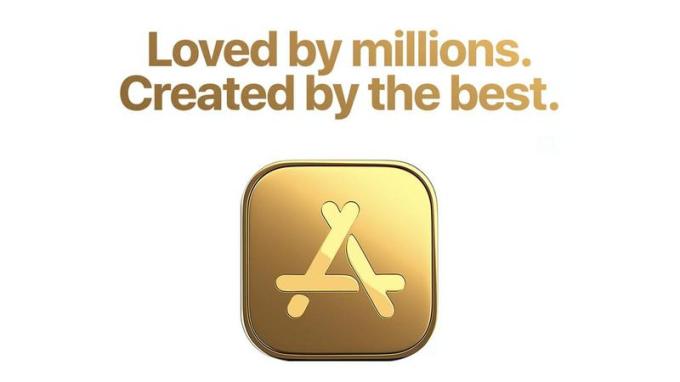 Apple has historically announced an annual “Best of” list of apps and games for the year, but now it’s turning this into a live event. Select media was invited to an event in New York on December 2, where they’ll have the opportunity to meet and chat with the year’s award winners in person. We understand this will be a more intimate affair, compared with the awards ceremony you see for the Design Award winners at WWDC. The event also gives app developers another reason to get excited about winning: increased press coverage.
Apple has historically announced an annual “Best of” list of apps and games for the year, but now it’s turning this into a live event. Select media was invited to an event in New York on December 2, where they’ll have the opportunity to meet and chat with the year’s award winners in person. We understand this will be a more intimate affair, compared with the awards ceremony you see for the Design Award winners at WWDC. The event also gives app developers another reason to get excited about winning: increased press coverage.
Salesforce and Apple partner on new education app
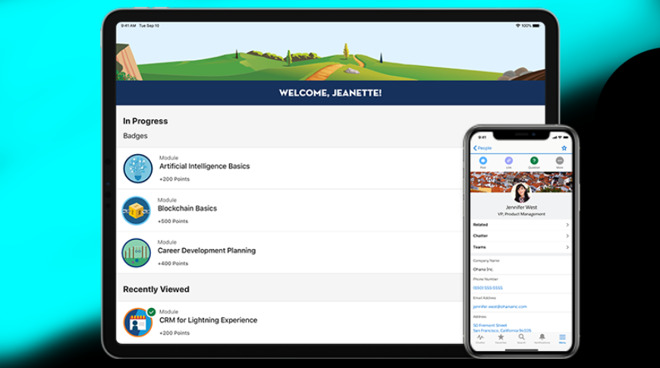 Salesforce this week released Trailhead Go, the first mobile version of Salesforce’s free education service, Trailhead, which provides business and technical skills training. The company also launched revised versions of the Salesforce mobile app, which includes new features like support for Siri Shortcuts and Face ID, as well as a new Salesforce SDK built with Swift and optimized for iOS 13.
Salesforce this week released Trailhead Go, the first mobile version of Salesforce’s free education service, Trailhead, which provides business and technical skills training. The company also launched revised versions of the Salesforce mobile app, which includes new features like support for Siri Shortcuts and Face ID, as well as a new Salesforce SDK built with Swift and optimized for iOS 13.
The two companies announced their partnership at last year’s Salesforce customer conference, Dreamforce, and it’s continuing to develop. Thanks to the deal, Salesforce gets direct access to Apple features and help with implementation, while Apple gains deeper access to the enterprise.
Remember how everyone was REALLY REALLY made about Photoshop on iPad?
Adobe took a lot of heat — and 1-star reviews — after releasing the long-awaited Photoshop for iPad. Instead of giving users a full version, it felt more like a beta with missing features. Adobe this week shared its roadmap in an attempt to quell user backlash. In 2019, it will add “Select Subject,” which aims to help address the omission of the “Magic Wand” selection tool. It also plans to ship a speedier, optimized version of the cloud documents system it introduced for Adobe Creative Cloud alongside Photoshop for iPad.
In 2020, the list of features grows to include the “Refine Edge” brush, Curves for making tonal adjustments, as well as more features for layer-based, non-destructive adjustment tools, and more.
Long reads and analysis
Apple Arcade’s impact on the premium game market: TL;DR? Hasn’t happened yet. The share of revenue generated by paid games on iOS fell to 1.8% as of September 30, 2019—its lowest ever — to approximately $337.3 million year-to-date on the App Store. But to what extent any of that can be attributed to Arcade versus other factors, including seasonal factors, remains unclear.
Apple’s integrated approach is fostering monopolistic behavior: Stratechery’s latest analysis looks at how Apple has begun to stifle innovation. In particular, the article looks at how Apple has locked down its NFC chip to give Apple Pay an advantage, the recent vaping app ban, and even the Mac keyboard.
How app recommendations are helped by machine learning: This week, DeepMind documented its collaboration with Google Play to explain how it uses machine learning technology to help make better, more nuanced app suggestions to users based on their prior behavior and download history.
App of the Week: Milkshake
Four months and 68K installs after its iOS release, Envato’s Milkshake app has come to Android. This female-founded startup has created an entirely free and customizable mobile website builder, specifically designed for “link in bio” businesses, like those that direct their Instagram following to their own “Insta websites.”
Game of the Week: HoloVista
Okay, we’re cheating a little — HoloVista is still being built. But you can get on the TestFlight beta now. The app, from founders Nadya Lev and Star St. Germain, previously of Zivity, uses mixed reality in its first title, HoloVista. The game cleverly combines storytelling through things like chat stories as well as game mechanics like hidden object-finding, but in a unique way — with 3D worlds and 360-degree photos. Players scan the room by either moving the phone around or dragging their fingers to locate items and snap photos, then insert those photos into chats to complete levels, for example. The story involves a mysterious architecture firm and the exploration of a dreamlike mansion filled with mysterious objects. The game is expected in 2020, but makes for an interesting trial run now.
Tweet of the Week:
* Click through to the presentations themselves, and soak up the ASO insights